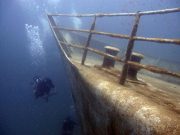Dive the HTMS Kled Kaeo Wreck
Mu Koh Phi Phi Marine National Park
The 382 ton supply ship 861 HTMS Kled Kaeo entered service in the Royal Thai Navy in 1956 as a transport support ship until being decommissioned and sunk as an artificial reef for close to Koh Phi Phi Leh on 19th March 2014.
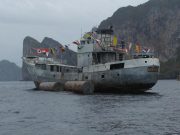
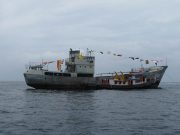
With a maximum speed of 12 knots, she was laid down as the 47.2m long, 7.7m wide RNoMS Norfrost in 1948 by Pusnes Mechanical Workshop, Arendal, Aust-Agder Norway.
Eight years later the ship was sold into the Royal Thai Navy as 861 HTMS Kled Kaeo, and now forms the newest dive site in Krabi province.
This is a great locaiton for the SSI Enriched Air Nitrox course, and we can also include the wreck dive as part of the SSI Advanced Adventurer course.
HTMS Kled Kaeo Marine Life
An Artificial Reef Success Story
Sitting east of Koh Phi Phi Leh, between Phi Ley Bay and Viking Bay, this wreck is already home to many thousands of fish.
Species living on and around the wreck include snapper, lionfish & scorpionfish, porcupine fish, grouper, rabbit fish, fusiliers, damselfish, trevally, squid and barracuda.

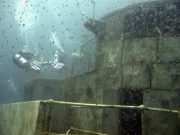
Find out more from the Thailand Department of National Parks on the Mu Koh Phi Phi Marine National Park.
Large Pelagics
Barracudas: Schools of barracudas are commonly seen patrolling the wreck. Their sleek, silver bodies and sharp teeth make them an exciting sight.
Trevally: These fast-moving predators often hunt around the wreck, particularly in the early morning or late afternoon.
Schooling Fish
Snappers: Huge schools of big-eye and five lined snapper are often found hovering near the Kled Kaeo wreck. Their bright shimmering yellow bodies create a striking contrast against the rusting metal of the ship.
Fusiliers: Blue streak and yellowtail fusiliers are abundant, forming massive schools that swirl around the structure.
Reef Fish
Lionfish: The wreck is a popular haunt for lionfish, with their distinctive venomous spines and slow, deliberate movements. Lionfish are normally solitary or found in pairs, however this is one of the few places to spot small schools of lionfish.
Scorpionfish: These well-camouflaged and highly poisonous fish blend in with the wreck's surfaces, lying in wait for unsuspecting prey. Be careful, large numbers of scorpionfish can be found around the Kled Kaeo wreck.
Pufferfish & Relatives: Various species of pufferfish, porcupinefish and boxfish, including the blackspotted puffer, and yellow boxfish are common here.
Bottom Dwellers
Moray Eels: Moray eels, particularly the giant moray, can often be seen peeking out from crevices in the wreck, their gaping mouths revealing sharp teeth.
Groupers: Large groupers, such as the brown-marbled grouper, are frequent residents, often seen resting near the wreck or inside its hollow spaces.
Macro Life
Nudibranchs: The wreck is home to various species of colourful nudibranchs, tiny sea slugs that are a favourite among underwater photographers. Wart slugs are also commonly spotted around the wreck.
Shrimps and Crabs: The crevices and nooks of the wreck shelter various shrimp species, like cleaner shrimp, and crabs, adding to the site's macro photography appeal.
Coral and Invertebrates
Soft Corals: Over time, the wreck has become encrusted with soft corals, sponges and hydroids, adding vibrant colours to the scene and attracting a diverse range of invertebrates.
Sea Fans: Gorgonian sea fans can also be seen growing on the wreck, providing habitat for various small critters.
Urchins: Longspine sea urchins have colonised large areas of the deck, and care should be taken not to brush past them, as the spikes create painful skin punctures.
Bivalves: Shellfish have quickly colonised almost every surface of the wreck, with clams wedged into crevices, oysters attached to hard surfaces, and dense clusters of mussels, adhering to various surfaces. Scallops are less common, but are also present on the wreck.
Occasional Sightings
Turtles: Although not common, green and hawksbill turtles occasionally visit the wreck, especially during feeding times.
Rays: Divers sometimes spot blue-spotted stingrays resting on the sandy seabed near the wreck.
Exploring the Kled Kaeo Wreck
Diving the Kled Kaeo Wreck from Lanta
Divers will find the Kled Kaeo wreck has settled with a list to port of around 10 degrees and there are many entry points to the wreck.
When originally sunk in 2014, the cargo holds, cabin doors, passage ways, steps, etc.were all open, allowing relatively easy wreck penetration.
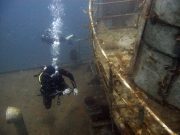

Divers will find that over time, the Kled Kaeo wreck has been rapidly colonised by dense marine life, making wreck penetration more and more difficult each season. Wreck penetration should only be carried out with the proper training and equipment.
The superstructure sits aft of midships, with the top of the wheel house / funnel area around 14m. Below the wheel house are two further decks with railings and ladders surrounding small cabins all of which offer penetration to suitably qualified divers.
From the superstructure, divers can travel to the stern of the ship which also has an aft deck with a covered cabin area and surrounding passageway. In the centre of the aft deck is a cargo hold entrance with a circular area behind which may have once held a fire-fighting pump.
Forward of the superstructure in the main hold area with the mast now lying horizontal along the centre of the ship, running right up to the forward cabins and deck area.
There are several small cabins and penetration points around the forward cargo holds with two cargo hold entrances on top of the forward deck, leading to the impressive bow.
HTMS Kled Kaeo: Diving Conditions
Visibility on the wreck varies and this dive is suitable for experienced divers. The position and north-south orientation of the wreck means that it is very sensitive to currents, making it less suitable for newly certified, inexperienced or less confident divers.
Diving the Kledkaeo wreck from Lanta is easy on our speedboats, however we can usually only dive this wreck during half-moon periods when the tides are less strong. It's also a fantastic dive to include in the SSI Advanced Adventurer course.
Due to it's depth, the Kledkaeo Wreck is usually dived first, with a second, more shallow dive on one of the nearby coral reefs, including Hin Klai, the Bida islands or Koh Phi Phi.
HTMS Kled Kaeo: Dive Site Guide
- NameHTMS Kledkaeo Wreck
- Visibility5m - 20m +
- Level of DivingMedium
- SnorkelingNo
- Depth14m - 27m +
- CurrentsMedium to Strong
- Journey Time30 - 40 mins
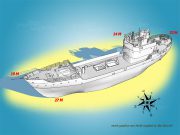
Book online to save 10% on dive trips and scuba courses on Koh Lanta.
the HTMS Kled Kaeo Wreck Diving Price
Koh Lanta Dive Trips
Fun Diving price at the HTMS Kled Kaeo Wreck is ฿3,150 for 2 dives. Diving price includes dive guide, free equipment rental, lunch & soft drinks on the boat when booked online in advance.
- 2 Dives
- FREE Equipment Rental
- Dive Guide
- Lunch & Soft Drinks
- 2 Dives
- FREE Equipment Rental
- Dive Guide
- Lunch & Soft Drinks
- You must be certified minimum SSI/PADI Open Water Diver, CMAS 1 Star Diver, BSAC Ocean Diver, or equivalent.
- Does not include Marine Park Diving Fee: Thai ฿240, Foreigner ฿600, per day.
See a complete list of all our Koh Lanta Diving Prices.
Book online to save 10% on dive trips and scuba courses on Koh Lanta.
Coral Reef Conservation
Protecting marine life at the HTMS Kled Kaeo Wreck
the HTMS Kled Kaeo Wreck is part of the Hat Noppharat Thara-Mu Ko Phi Phi National Park, a marine protected area. This status helps preserve the underwater ecosystem at the HTMS Kled Kaeo Wreck, and ensures sustainable tourism practices.
Divers visiting the HTMS Kled Kaeo Wreck are encouraged to follow guidelines that minimise their impact on the environment
Responsible Diving Practices
To protect the delicate marine environment, divers are urged to follow responsible diving practices, including:
- Avoid touching or disturbing marine life while diving at the HTMS Kled Kaeo Wreck: Many marine organisms are delicate and can be harmed by human contact.
- Practice good buoyancy control while diving at the HTMS Kled Kaeo Wreck: Maintaining proper buoyancy helps prevent accidental damage to corals and other marine life.
- Do not collect souvenirs from the HTMS Kled Kaeo Wreck: Removing shells, corals, or other marine life from the sea is illegal and harmful to the ecosystem.
- Dispose of waste properly: Do not throw any rubbish or food into the sea, especially at the dive site. Throwing food into the water at a coral reef interferes with the delicate marine eco-system.
- Use Reef Safe Sun Block: Ensure your sunscreen is Reef Safe and does not harm the corals and marine life at the HTMS Kled Kaeo Wreck.
Koh Lanta Dive Sites
Some of Thailand's Best Diving
the HTMS Kled Kaeo Wreck is one of the best dive sites in Thailand, and can be easily dived from Koh Lanta by speedboat along with many of Thailand's other top dive sites:
- Lanta Marine Park
- Koh Haa Islands
- Koh Rok Islands
- Hin Daeng & Hin Muang
- Hin Musang Wildlife Reserve
- Shark Point & Anemone Reef
- Phi Phi Marine Park
- Bida Nok & Bida Nai
- Hin Bida
- Koh Phi Phi
- HTMS Kledkaeo Wreck
- Hin Klai
Find out more at the Thai Department of National Parks.
Our Dive Trip Schedule
Lanta Dive trips from mid Oct - mid May
Our dive trips depart Koh Lanta in the morning every day during high season from the south end of Long Beach, normally returning around 1:30 - 2pm.
| Week Day | Boat 1 | Boat 2 |
| Monday | Koh Bida / Phi Phi | Koh Bida / Phi Phi |
| Tuesday | Koh Haa Islands | Hin Daeng & Hin Muang |
| Wednesday | Koh Bida / Phi Phi | Koh Bida / Phi Phi |
| Thursday | Koh Haa Islands | Koh Haa Islands |
| Friday | Koh Haa Islands | Hin Daeng & Hin Muang |
| Saturday | Koh Bida / Phi Phi | Koh Bida / Phi Phi |
| Sunday | Koh Haa Islands | Koh Haa Islands |
- All trips are 2 dives a day
- Trips depart from the beach at our dive shop @ Lanta Castaway Beach Resort
- Trips Depart 8/9am, return 2pm
- Dive & Relax is open from mid Oct - mid May.
- E-mail us info@diveandrelax.com in advance with any questions, or to make a booking.
We may schedule a Shark Point & Anemone Reef dive trip or a KledKaeo Wreck & Hin Klai dive trip upon request. A minimum of 5 divers are required for these trips, please let us know if you are interested.
We love to dive as much as possible during the high season, however all our dive trips depend on the weather, sea conditions, currents and minimum numbers and may be subject to change at short notice.
For more information on our weather and climate, check out the best time to visit Koh Lanta.
Book online to save 10% on dive trips and scuba courses on Koh Lanta.



